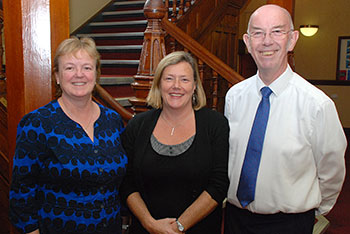Spirituality plays huge part in patients’ recovery from illness

Thu, 06 Nov 2014 11:40:00 GMT
The University leads research and teaching into spirituality in health care to give people “hope, meaning and purpose”
THE term ‘spirituality’ is now widely used to describe the qualities that give people hope, meaning and purpose. In the case of patients, it can aid their recovery. The University of Huddersfield has become a key centre for research into spirituality and how it can be integrated into health care teaching and practice.
Articles, overseas conference presentations and now close links with an NHS trust are among the recent outputs and activities of the University’s Spirituality Special Interest Group, based in the School of Human and Heath Sciences. Established for ten years, the group has also run a series of master classes for health and social care practitioners.
Spirituality is embedded in a wide range of undergraduate courses – covering subject areas such as psychology, social work, nursing, physiotherapy and occupational therapy – and four PhD students are currently carrying out research on spirituality in health care. Also, plans are being made for a 2015 conference on the subject.
Spiritual partner of the South West Yorkshire Partnership NHS Foundation Trust
 Melanie Rogers (stood centre) is a Senior Lecturer and Advanced Nurse Practitioner at the University and one of the leaders of the special interest group, alongside Professor John Wattis and Senior Lecturer Janice Jones (both pictured left). She admits that many people regard spirituality as a nebulous term, or one that is often conflated with religion. However, she says, spirituality is intensely practical.
Melanie Rogers (stood centre) is a Senior Lecturer and Advanced Nurse Practitioner at the University and one of the leaders of the special interest group, alongside Professor John Wattis and Senior Lecturer Janice Jones (both pictured left). She admits that many people regard spirituality as a nebulous term, or one that is often conflated with religion. However, she says, spirituality is intensely practical.
“It helps to sustain health care workers and patients by recognising and supporting a sense of meaning and purpose in life. It can improve resilience in patients and practitioners alike, in addition to improving the experience of illness and crisis in patients.”
She acknowledges that for some people, spirituality derives from religious beliefs. But for many others it stems from factors such as their relationships, community connections and special interests.
The University’s special interest group is now a “spiritual partner” of the South West Yorkshire Partnership NHS Foundation Trust, which provides community, mental health and learning disability services in Barnsley, Calderdale, Kirklees and Wakefield. It has embedded spirituality into its work.
“Spirituality and the practitioners approach to their patients play a huge part in recovery from illness,” said Melanie Rogers, whose recent co-authored articles include an evaluation of therapeutic optimism, dealing with the role played by a practitioner’s belief in a patient’s recovery.
 “Patients can lose optimism, but the practitioner needs to try and facilitate it. One way is to spend time listening to the patient – being fully present and engaged in the relationship. Spirituality is about the patient being the focus and it is very practical, not at all airy fairy, and we know it sustains health care workers and patients,” said Ms Rogers, who has been invited to join the executive of the British Association for the Study of Spirituality.
“Patients can lose optimism, but the practitioner needs to try and facilitate it. One way is to spend time listening to the patient – being fully present and engaged in the relationship. Spirituality is about the patient being the focus and it is very practical, not at all airy fairy, and we know it sustains health care workers and patients,” said Ms Rogers, who has been invited to join the executive of the British Association for the Study of Spirituality.
Her most recent article is ‘Health care lecturers’ perceptions of spirituality in education’, in the leading journal Nursing Standard presenting research carried out at the University originally led by Dr Sharon Prentis, a former member of staff. Her co-authors were University of Huddersfield colleagues Professor Wattis, Dr John Stephenson and Janice Jones. Also, Melanie Rogers and Janice Jones have presented at conferences on spirituality that have taken place in the UK and overseas.
Although spirituality is gaining increasing recognition, it is still not spread evenly across the spectrum of health care.
“Occupational therapy has taken a lead, and there is growing amount of evidence in the fields of mental health and palliative care, but many of the other disciplines struggle to know how to integrate it into their care,” said Melanie Rogers. Research and teaching at the University of Huddersfield aims to correct this imbalance.







